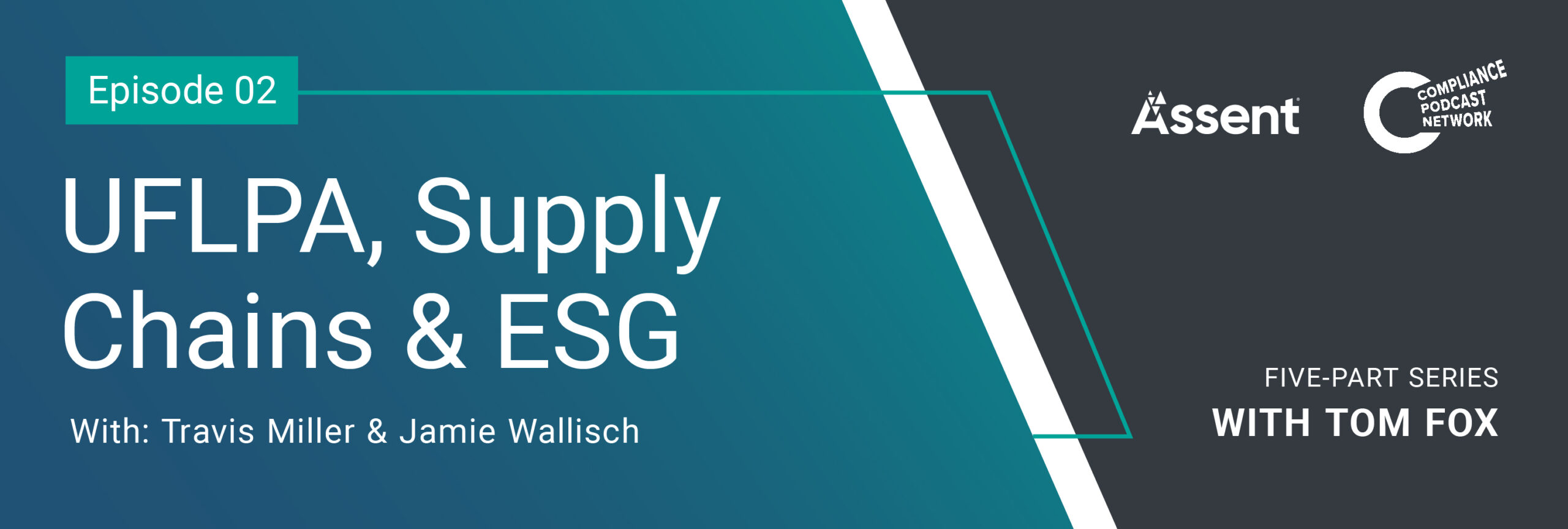I recently had the opportunity to visit with several folks from Assent Inc. for a sponsored podcast series entitled Supply Chain and ESG – What You Need to Know. We discussed: ESG drivers with Jared Connors and James Calder; UFLPA, Supply Chain and ESG with Travis Miller and Jamie Wallisch; the New World of Product Compliance and ESG, with Cally Edgren and Devin O’Herron; Emissions Reporting Strategies with Devin O’Herron and Jared Connors; and Responsible Minerals, Supply Chain and ESG, with Jared Connors and Daniel Zamora. Today we review the intersection of the Uyghur Forced Labor Prevention Act (UFLPA), Supply Chains and ESG.
The UFLPA is a law which targets goods made, whole or in part, by forced labor in the China Jing Jang region or made by forced labor in other parts of China by Uighurs, or other minorities. Wallisch explained that it is designed to operate as a de facto trade ban on goods from the Jing Jang region of China. US businesses will face the high burden needed to overcome an expectation of forced labor presumption. Wallisch believes this is the most “significant law placed around the issue of forced labor, and it has the most tangible and concrete terms of repercussions, that companies can potentially face.” Further, she believes the key will be around your documentation to provide to US Customs and Border Protection. Miller noted that this means if you are “asking companies to look back into where the actual sand came from, that got turned into the silica, that got turned into the semiconductor, that got turned into the circuit board, that got turned into the device that finds its way into your laptop. There’s just never been anything like it.”
Interestingly, this ties directly into a company’s overall ESG framework as it is combining all elements in such a program. When you tie the UFLPA, together with anti-corruption laws such as the Foreign Corrupt Practices Act (FCPA), export controls laws and regulations enacted by both the Trump and Biden Administrations and anti-money laundering (AML) laws, such as the AML Law of 2020, you begin to see a more integrated approach by the government and how companies must respond with an integrated approach such as a corporate ESG program. Wallisch concluded, “it’s really signaling the intersectionality of all these particular topics under ESG.”
Miller noted, interestingly, about how much this law and its guidance weave together existing business processes. He believes the UFLPA was “birthed out of the America Supply Chain Executive Order in the US/China trade war, which was focused on semiconductors, critical, raw materials elements that are the subject of the extractives. To comply with it, you could not actually start unless you already had a product compliance program in place. This means that if you do not know the bill of materials, if you do not have an approved vendor list, if you do not know where your components are being manufactured; how do you even begin the ESG program? So really in my opinion, the UFLPA is not novel in that it created something new; it is novel in that it is forcing companies to use all the existing business processes to tie back the breadcrumbs and figure out things that they should already know and then to be responsible for reporting on them.”
Miller believes that even with the UFLPA and other regulatory initiatives, the real driver here is business and business operations. He believes it will require organizations to recognize that their organizational footprint, for each business extends beyond the four corners of the organization. This will come into play for financing whether through private equity investment, public market offerings, bank loans or other mechanisms. It has not extended down into individual responses to requests for quotes in the business world.
Equally importantly, he said, “it’s also about who you chose to do business with, who you chose to profit from, and it’s not enough that you can just say, well, I outsource the bad stuff; slaves being used in my supply chain and bribery occurring in the same place. That is no longer a sufficient answer. It’s this assessment, it’s this realization that you are the sum of your components. You are the sum of your relationships. The business is not an island. It’s everything being pulled together and your entire impact on the globe, on the people on the world, on the business processes that derives your profitability now must be considered. And that’s quite revolutionary. If you think about it.”
Join us in Part 3, where we consider the new world of product compliance and ESG.
To listen to the podcast this blog post is based upon, click here.




 ESG Supply Chain Compliance with Travis Miller and Jared Connors:
ESG Supply Chain Compliance with Travis Miller and Jared Connors: Companies are starting to realize the significance of making a commitment to ESG through responsible sourcing.
Companies are starting to realize the significance of making a commitment to ESG through responsible sourcing.